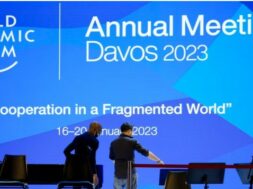
WEF: India, B’Desh may benefit in likely global recession in 2023
Virendra Pandit
New Delhi: A global recession is likely this year but India and Bangladesh may benefit from global trends, the World Economic Forum (WEF) said on Monday.
Pressures on food, energy, and inflation may peak in 2023, the WEF, in its Chief Economists Outlook Survey, said, according to the media reports.
Some economies in the South Asia region, including India and Bangladesh, may benefit from global trends like diversification of manufacturing supply chains away from China.
Globally, businesses may cut costs significantly in response to economic headwinds, but chief economists are optimistic about inflation and strong balance sheets.
A majority of the WEF’s Community of Chief Economists expect to see geopolitical tensions continuing to shape the global economy, and anticipate further monetary tightening in the United States and Europe.
Almost two-thirds of chief economists believe a global recession might follow in 2023. Over 18 percent of them consider it extremely likely, over twice as many as in the previous survey conducted in September 2022.
But a third of respondents consider a global recession unlikely this year.
There is, however, a strong consensus that the prospects for growth in 2023 are bleak, especially in Europe and the US.
All of the chief economists surveyed expect weak or very weak growth in 2023 in Europe, while 91 percent expect weak or very weak growth in the US.
In China, expectations of growth are polarised, with respondents almost evenly split between those who expect weak or strong growth.
On inflation, the chief economists see significant variation across regions, with the proportion expecting high inflation in 2023, ranging from just 5 percent for China to 57 percent for Europe.
“With two-thirds of chief economists expecting a worldwide recession in 2023, the global economy is in a precarious position. The current high inflation, low growth, high debt, and high fragmentation environment reduces incentives for the investments needed to get back to growth and raise living standards for the world’s most vulnerable,” WEF Managing Director Saadia Zahidi said.
“Leaders must look beyond today’s crises to invest in food and energy innovation, education and skills development, and in job-creating, high-potential markets of tomorrow. There is no time to lose,” she added.
More broadly, the chief economists expect the global landscape to remain challenging for businesses as they all expect global geopolitical trends to continue redrawing the map of global economic activity along new geopolitical fissures and fault lines.
This wider economic shift will likely reverberate through trade, investment, labor, and technology flows, creating myriad challenges and opportunities for business. One positive signal is that supply chain disruptions are not expected to cause a significant drag on business activity in 2023.













